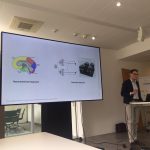 Am 5. und 6. September 2022 fand unter dem Titel „Democracy in the Digital Constellation. Interdisciplinary Perspectives“ der internationale Abschlussworkshop unserer seit bald fünf Jahren andauerenden Forschungsarbeit statt. In vier Panels hatten wir uns Expert*innen aus Politikwissenschaft, Soziologie, Kommunikations- und Rechtswissenschaft eingladen, die unsere Arbeit stark geprägt haben und mit denen wir wechselseitig unsere und ihre Forschungsarbeiten diskutieren wollten. Mit dabei als geladene Gäster waren: Vincent August, Robert Seyfert, Hannah Ruschemeier, Giovanni De Gregorio, Annie Waldherr, Jan-Felix Schrape, Paula Diehl und Rahel Süß – hinzu kamen einige unserer langjährigen Begleiter aus dem Berliner Kontext. Thematisch waren die Sektionen gegliedert nach verschiedenen Bereichen demokratischer Rekonfiguration: Democratic Governance, Constitutional and Fundamental Rights, Public Sphere, Participation and Representation. Das komplette Programm könnt ihr hier einsehen. Es waren zwei fantastische Tage mit langen Diskussionen in einem interdiszplinären Setting, wo jeder sich wirklich für die anderen Perspektiven interessierte – und damit ein perfekter Spiegel für die Jahre der Arbeit in der DigiDem-Gruppe. Danke an alle, die teilgenommen haben!
Am 5. und 6. September 2022 fand unter dem Titel „Democracy in the Digital Constellation. Interdisciplinary Perspectives“ der internationale Abschlussworkshop unserer seit bald fünf Jahren andauerenden Forschungsarbeit statt. In vier Panels hatten wir uns Expert*innen aus Politikwissenschaft, Soziologie, Kommunikations- und Rechtswissenschaft eingladen, die unsere Arbeit stark geprägt haben und mit denen wir wechselseitig unsere und ihre Forschungsarbeiten diskutieren wollten. Mit dabei als geladene Gäster waren: Vincent August, Robert Seyfert, Hannah Ruschemeier, Giovanni De Gregorio, Annie Waldherr, Jan-Felix Schrape, Paula Diehl und Rahel Süß – hinzu kamen einige unserer langjährigen Begleiter aus dem Berliner Kontext. Thematisch waren die Sektionen gegliedert nach verschiedenen Bereichen demokratischer Rekonfiguration: Democratic Governance, Constitutional and Fundamental Rights, Public Sphere, Participation and Representation. Das komplette Programm könnt ihr hier einsehen. Es waren zwei fantastische Tage mit langen Diskussionen in einem interdiszplinären Setting, wo jeder sich wirklich für die anderen Perspektiven interessierte – und damit ein perfekter Spiegel für die Jahre der Arbeit in der DigiDem-Gruppe. Danke an alle, die teilgenommen haben!

